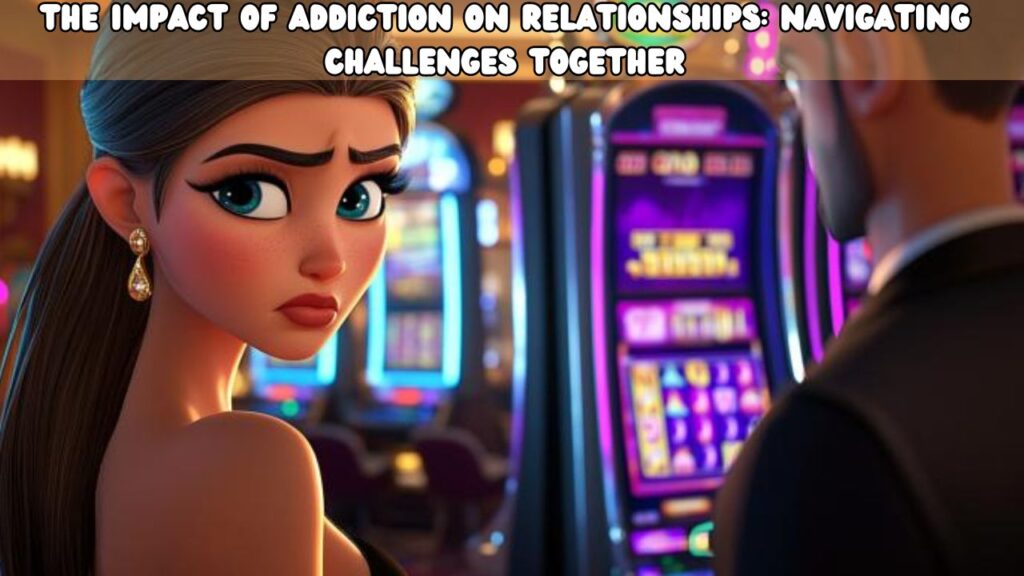Addiction is an insidious force that can creep into the most sacred parts of our lives, often going unnoticed until its grip is too tight to ignore. My own experience with a loved one’s addiction was a profound and painful journey that reshaped my understanding of relationships, trust, and resilience. It is from this deeply personal place that I write about the impact of addiction on relationships, hoping to shed light on this complex issue and offer support to those who may be walking a similar path.
Personal Experience
I remember the exact moment when I realized that addiction had infiltrated my relationship. It wasn’t a dramatic revelation but a slow, dawning awareness that something was fundamentally wrong. The person I loved seemed to be slipping away, replaced by someone I hardly recognized. Their moods were erratic, their priorities shifted, and our once-strong connection began to fray. Watching someone you care about struggle with addiction is heart-wrenching. The feelings of betrayal, helplessness, and frustration can be overwhelming, and it’s easy to feel isolated in this struggle. My experience, though painful, taught me invaluable lessons about compassion, boundaries, and the importance of seeking help.
Why This Topic Matters
Addiction is a pervasive issue that affects millions of people worldwide, and its impact extends far beyond the individual struggling with it. Relationships, whether romantic, familial, or platonic, are often deeply affected by addiction. The emotional, psychological, and even physical tolls can be devastating, leading to a breakdown in communication, trust, and overall relationship health. Addressing the impact of addiction on relationships is crucial because it highlights the interconnectedness of our well-being and the importance of a supportive network. By discussing this topic, we can help reduce the stigma surrounding addiction, encourage open dialogue, and promote healing for both individuals and their loved ones.
Setting the Tone for the Article
This article aims to explore the multifaceted impact of addiction on relationships, from the emotional toll it takes on partners to the broader ripple effects on family dynamics. We will delve into the challenges faced by those in relationships with individuals struggling with addiction and offer practical advice on navigating these difficulties. By understanding the nature of addiction, recognizing its signs, and seeking help together, couples can begin to rebuild trust and move towards a healthier, more balanced relationship. Just as in a yoga practice, where we encounter and overcome challenges through patience and perseverance, relationships affected by addiction can also grow stronger through dedication and mutual support. Let’s embark on this journey together, embracing the challenges and opportunities for growth that lie ahead.
Understanding Addiction

Understanding addiction is the first step in addressing its impact on relationships. Addiction is a complex and multifaceted issue that affects not just the individual but also their loved ones. To effectively navigate the challenges it brings, we must first grasp what addiction entails, recognize its signs, and comprehend how it alters the brain’s functioning.
Definition and Types of Addiction
Addiction is a chronic disease characterized by the compulsive use of substances or engagement in behaviors despite harmful consequences. It’s important to note that addiction is not limited to drugs and alcohol. Behavioral addictions, such as gambling, gaming, and even shopping, can also have devastating effects on individuals and their relationships. Understanding the different types of addiction can help in identifying and addressing specific challenges.
Recognizing the Signs
Early recognition of addiction is crucial for seeking timely intervention. Some common signs of addiction include changes in behavior, increased secrecy, withdrawal from social activities, and neglect of responsibilities. Physical signs may include changes in appearance, health issues, and unexplained financial problems. Being aware of these indicators can help loved ones take proactive steps to address the issue.
The Brain and Addiction
Addiction profoundly affects the brain’s reward system, which plays a crucial role in motivation and pleasure. Substances or addictive behaviors trigger a surge of dopamine, creating a sense of euphoria. Over time, the brain becomes dependent on these substances or behaviors to experience pleasure, leading to compulsive use. This neurological hijacking makes it incredibly challenging to break free from addiction without proper support and intervention.
By understanding what addiction is, recognizing its signs, and knowing how it impacts the brain, we can better equip ourselves to address its effects on relationships. This knowledge forms the foundation for the strategies and approaches we will explore in the following sections.
The Emotional Toll on Partners

Addiction doesn’t just affect the individual struggling with it; it also profoundly impacts their partners and loved ones. The emotional toll can be overwhelming, leading to feelings of betrayal, anxiety, and a constant state of emotional upheaval. Understanding these emotional challenges is essential for addressing and healing the wounds that addiction inflicts on relationships.
Feelings of Betrayal
One of the most significant emotional impacts of addiction on partners is the profound sense of betrayal. Discovering that a loved one has been hiding an addiction can shatter the foundation of trust that the relationship is built upon. This betrayal can manifest in several ways:
- Broken Promises: Partners often feel betrayed by broken promises and commitments. The person struggling with addiction may repeatedly vow to quit or cut back, only to relapse or continue their addictive behavior.
- Deception and Lies: To cover up their addiction, individuals may lie about their activities, whereabouts, and finances. This deception erodes trust and leaves partners feeling hurt and deceived.
- Infidelity: In some cases, addiction can lead to infidelity, further deepening the sense of betrayal and emotional pain.
These feelings of betrayal can be difficult to overcome, but acknowledging them is the first step towards healing and rebuilding trust.
Anxiety and Stress
Living with a partner who struggles with addiction often results in chronic anxiety and stress. The unpredictability and instability that addiction brings can create a constant state of worry and tension:
- Fear of Relapse: Partners may live in constant fear of their loved one relapsing, leading to heightened anxiety and hypervigilance.
- Financial Worries: Addiction can drain financial resources, causing significant stress and worry about bills, debts, and future financial stability.
- Safety Concerns: Partners might also worry about the safety and well-being of their loved one, especially if the addiction involves dangerous substances or behaviors.
This relentless anxiety can take a toll on both mental and physical health, making it crucial for partners to seek support and coping strategies.
Emotional Roller Coaster
The journey of living with someone who has an addiction is often likened to riding an emotional roller coaster. The highs and lows can be extreme and exhausting:
- Moments of Hope: There may be periods when the individual seems to be doing well, attending meetings, or staying clean. These moments bring hope and relief.
- Crushing Disappointments: Unfortunately, these highs are often followed by lows, such as relapses or broken promises. Each setback can feel like a crushing disappointment, making it hard to maintain optimism.
- Constant Uncertainty: The unpredictability of addiction creates a constant state of uncertainty. Partners may never know what to expect, leading to emotional instability and exhaustion.
Navigating these emotional highs and lows requires resilience, patience, and often professional support to maintain emotional well-being.
The emotional toll of addiction on partners is profound and multifaceted. From feelings of betrayal to chronic anxiety and the relentless ups and downs, these emotional challenges can strain even the strongest relationships. Recognizing and addressing these emotions is vital for partners to find healing and for relationships to recover from the impact of addiction. In the following sections, we will explore practical steps and strategies to help partners cope with these emotional challenges and work towards rebuilding trust and stability in their relationships.
Communication Breakdown

Effective communication is the cornerstone of any healthy relationship. However, addiction often leads to significant communication breakdowns, exacerbating the strain on relationships. Trust issues, misunderstandings, and escalating conflicts are common as addiction disrupts the ability to communicate openly and honestly. Understanding these breakdowns is essential for finding ways to restore and improve communication.
Trust Issues
Trust is fundamental in any relationship, and addiction can severely undermine it. The erosion of trust due to addiction creates significant barriers to effective communication:
- Repeated Lies: When a partner repeatedly lies about their addiction, whereabouts, or behaviors, it creates a pervasive atmosphere of mistrust. The partner who has been lied to may constantly doubt the addict’s words, questioning their honesty and intentions.
- Broken Promises: Addicts often make promises to change, seek help, or stop their addictive behavior. When these promises are not kept, the resulting disappointment and betrayal further damage trust.
- Secrecy: Addictive behaviors are often shrouded in secrecy. The need to hide substance use or addictive activities means that important conversations are avoided or manipulated, leaving partners feeling excluded and suspicious.
Restoring trust requires time, consistent honesty, and effort from both partners. Open communication and transparency are critical steps in rebuilding trust and fostering a more secure relationship.
Misunderstandings and Miscommunications
Addiction can lead to frequent misunderstandings and miscommunications, creating a cycle of frustration and resentment:
- Different Realities: The partner struggling with addiction and the one without it often live in different realities. The addicted partner may minimize the severity of their addiction or be in denial, while the other sees the full impact. This disconnect can lead to significant misunderstandings about the nature of the problem and the steps needed to address it.
- Emotional Barriers: Addiction brings a host of intense emotions—shame, guilt, anger, fear—that can cloud judgment and communication. Partners may misinterpret these emotions, leading to further miscommunication and conflict.
- Lack of Clarity: Conversations about addiction are often fraught with tension and can lack clarity. One partner might avoid the topic or communicate in vague terms to avoid conflict, while the other might push for more directness, resulting in more confusion and frustration.
Improving communication requires both partners to develop better listening skills, express themselves clearly, and work on understanding each other’s perspectives.
Conflict Escalation
The stress and emotional turmoil caused by addiction often lead to conflicts that can quickly escalate:
- Heightened Emotions: Addiction-induced stress heightens emotions, making it easier for small disagreements to escalate into significant conflicts. The partner struggling with addiction might be more defensive or irritable, while the other partner may be more sensitive and reactive.
- Frequent Arguments: The ongoing issues surrounding addiction, such as financial problems, broken promises, and emotional pain, often lead to frequent arguments. These arguments can become repetitive and cyclical, with the same issues being rehashed without resolution.
- Blame and Accusations: In the heat of the moment, partners might resort to blaming and accusing each other. The non-addicted partner might accuse the other of not caring or trying hard enough, while the addicted partner might feel attacked and misunderstood, leading to further defensiveness and withdrawal.
To de-escalate conflicts, partners need to practice patience, empathy, and conflict-resolution skills. Professional counseling can also provide tools and strategies to manage conflicts more effectively.
The Ripple Effect on Family Dynamics

Addiction doesn’t exist in a vacuum; it affects the entire family unit, creating a ripple effect that touches everyone involved. Understanding the broader impact of addiction on family dynamics is crucial for addressing and mitigating these effects. This includes the profound impact on children, the strain on extended family members, and the significant financial consequences.
Impact on Children
Children are often the silent sufferers in families affected by addiction. The environment created by addiction can have long-lasting effects on their emotional, psychological, and even physical well-being:
- Emotional Instability: Children thrive on stability and predictability, but addiction disrupts this, leading to an emotionally volatile environment. They may experience fear, confusion, and anxiety as they try to make sense of their parent’s erratic behavior.
- Neglect and Inconsistency: The attention and care that children need might be compromised as a parent struggles with addiction. This neglect can lead to feelings of abandonment and low self-esteem.
- Behavioral Issues: Children may act out or develop behavioral issues as a response to the stress and instability in their home environment. They might have trouble in school, exhibit aggressive behavior, or withdraw socially.
- Role Reversal: In some cases, children may be forced to take on adult responsibilities, caring for their siblings or managing household tasks, which can rob them of their childhood.
Addressing these impacts requires creating a supportive and stable environment for children, seeking professional help, and ensuring they have access to therapy and support groups designed for young people affected by addiction.
Strain on Extended Family
The effects of addiction often extend beyond the immediate family, placing significant strain on extended family members:
- Increased Responsibilities: Grandparents, aunts, uncles, and other relatives may find themselves stepping in to provide care and support for the children or the addicted individual. This added responsibility can be overwhelming and stressful.
- Emotional Stress: Extended family members may experience a range of emotions, from worry and anger to guilt and helplessness. Watching a loved one struggle with addiction can be incredibly painful, and the emotional toll can affect their own well-being and relationships.
- Conflicted Loyalties: Family members may feel torn between supporting the person with addiction and protecting their own mental health and the well-being of other family members. This can create tensions and conflicts within the family unit.
- Communication Breakdowns: The secrecy and denial often associated with addiction can lead to communication breakdowns among family members. Misunderstandings and conflicting opinions on how to handle the situation can further strain relationships.
Building a support network within the extended family, engaging in open and honest communication, and seeking family therapy can help manage these strains and foster a more cohesive approach to dealing with addiction.
Financial Consequences
Addiction can have severe financial repercussions for the entire family, compounding the stress and challenges they face:
- Depletion of Savings: The cost of maintaining an addiction can quickly deplete family savings, leading to financial instability and insecurity. Money that would have been used for essential expenses, education, or future planning might be diverted to support the addiction.
- Debt Accumulation: Families may find themselves in significant debt as they try to cover the costs associated with addiction, including purchasing substances, legal fees, and medical bills. This debt can create long-term financial challenges.
- Employment Issues: The addicted individual may struggle to maintain steady employment due to their addiction, leading to a loss of income. In some cases, the non-addicted partner may also experience job-related issues due to the stress and time spent dealing with the addiction at home.
- Legal and Medical Expenses: Addiction often leads to legal issues, such as arrests or lawsuits, and medical expenses related to health complications or treatment. These costs can be substantial and add to the financial burden.
Addressing the financial consequences of addiction requires a comprehensive approach, including seeking financial counseling, exploring community resources, and planning for long-term recovery and financial stability.
Seeking Help Together

Recognizing the need for help and taking steps towards recovery can be a turning point in relationships affected by addiction. Seeking help together fosters a sense of unity and shared responsibility, which can strengthen the relationship and support long-term recovery. Here’s how couples can approach this process effectively.
Acknowledging the Problem
The first and most crucial step in seeking help is acknowledging the existence of the problem. This step requires honesty, courage, and a willingness to confront difficult truths:
- Open Communication: It’s essential for both partners to engage in open and honest conversations about the addiction and its impact on their relationship. This might be challenging, especially if there has been a history of denial or secrecy, but it is a necessary foundation for seeking help.
- Mutual Recognition: Both partners need to recognize the severity of the addiction and its consequences. This mutual recognition can help in forming a united front against the addiction.
- Empathy and Understanding: Approaching the conversation with empathy and understanding can make it easier for the addicted partner to acknowledge their problem. Blame and judgment can create defensiveness and hinder progress.
- Setting Realistic Goals: Acknowledging the problem also involves setting realistic goals for recovery. Understanding that addiction is a complex issue that requires time and effort to overcome can help in setting achievable milestones.
By acknowledging the problem together, couples can create a solid foundation for the next steps in their recovery journey.
Counseling and Therapy Options
Professional counseling and therapy can provide the structured support needed to navigate the challenges of addiction and recovery:
- Individual Therapy: Both partners can benefit from individual therapy sessions. The addicted partner can explore the underlying issues contributing to their addiction, while the non-addicted partner can address their own emotional struggles and learn coping strategies.
- Couples Therapy: Couples therapy focuses on rebuilding the relationship, improving communication, and addressing trust issues. A skilled therapist can guide the couple through difficult conversations and help them develop healthier interaction patterns.
- Family Therapy: Involving the entire family in therapy can be beneficial, especially if children or extended family members are affected. Family therapy sessions can address the broader impact of addiction and foster a supportive family environment.
- Specialized Treatment Programs: Depending on the severity of the addiction, specialized treatment programs such as inpatient rehab, outpatient programs, or intensive outpatient programs might be necessary. These programs provide comprehensive care, including medical support, counseling, and life skills training.
Choosing the right type of therapy or treatment program depends on the specific needs of the individuals and the relationship. Professional guidance can help in making informed decisions about the best course of action.
Support Groups and Resources
Support groups and community resources offer invaluable support for both the addicted individual and their partner:
- Support Groups for Addicts: Groups like Alcoholics Anonymous (AA) or Narcotics Anonymous (NA) provide a supportive community for individuals struggling with addiction. These groups offer a safe space to share experiences, gain insights, and receive encouragement from others who have faced similar challenges.
- Support Groups for Partners: Groups such as Al-Anon and Nar-Anon are specifically designed for the partners and families of addicts. These groups provide a supportive network where partners can share their experiences, learn from others, and gain emotional support.
- Online Resources: There are numerous online resources, including forums, educational websites, and virtual support groups, that can offer additional support and information. These resources can be particularly helpful for those who may have limited access to in-person support groups.
- Community Programs: Many communities offer resources such as counseling services, educational workshops, and recovery programs. These programs can provide practical assistance and support for both partners.
Engaging with support groups and resources helps in building a strong support network, which is crucial for sustaining recovery and maintaining relationship health.
Moving Forward: Building a Healthy Relationship

Moving forward from the impact of addiction requires dedication and mutual effort to build a healthier, more resilient relationship. This journey involves emphasizing self-care, creating a supportive environment, and developing long-term strategies for maintaining sobriety and relationship health. Here’s a detailed look at how couples can navigate this path.
Emphasizing Self-C Care
Self-care is essential for both partners in a relationship affected by addiction. It involves prioritizing one’s physical, emotional, and mental well-being to foster a healthier dynamic.
- Physical Health: Maintaining physical health through regular exercise, a balanced diet, and adequate sleep is crucial. Exercise can reduce stress and improve mood, while proper nutrition and rest are foundational to overall well-being.
- Mental Health: Engaging in activities that promote mental health, such as mindfulness practices, meditation, and hobbies, can provide relief from the stress and emotional turmoil associated with addiction. Mindfulness and meditation can help manage anxiety and foster a sense of calm and clarity.
- Emotional Health: Seeking therapy or counseling for oneself, engaging in journaling, and practicing emotional awareness are vital. Partners should allow themselves to feel and process their emotions, whether it’s through talking with friends, joining support groups, or personal reflection.
- Boundaries and Personal Time: Establishing personal boundaries and ensuring each partner has time for themselves is important. It helps in preventing burnout and maintaining individual identity and well-being within the relationship.
By emphasizing self-care, both partners can approach their relationship with a healthier mindset and greater emotional resilience.
Creating a Supportive Environment
Creating a supportive environment is key to fostering recovery and building a healthy relationship. This involves mutual support, clear communication, and a nurturing home atmosphere.
- Open Communication: Encouraging open, honest, and non-judgmental communication is essential. Partners should feel safe to express their thoughts, fears, and needs. Regular check-ins and discussions about feelings, progress, and challenges can help maintain a strong connection.
- Mutual Support: Supporting each other through recovery means being empathetic, patient, and encouraging. Celebrating small victories together, offering encouragement during tough times, and being a reliable source of support can strengthen the relationship.
- Creating a Safe Space: Ensuring the home environment is free from triggers and stressors related to addiction is crucial. This might involve removing substances from the home, creating routines that promote sobriety, and maintaining a calm and organized living space.
- Shared Activities: Engaging in activities that both partners enjoy can help rebuild the bond and create positive experiences together. Whether it’s cooking, hiking, or taking a class together, shared activities can foster closeness and joy.
A supportive environment nurtures both partners and provides a solid foundation for recovery and relationship health.
Long-Term Strategies for Maintaining Sobriety and Relationship Health
Sustaining sobriety and a healthy relationship requires long-term strategies that involve continuous effort and commitment.
- Continued Therapy and Counseling: Regular therapy or counseling sessions, both individually and as a couple, can provide ongoing support and guidance. Therapy helps address underlying issues, improves communication, and offers strategies for managing stress and conflicts.
- Support Group Participation: Continuing to attend support groups like AA, NA, Al-Anon, or Nar-Anon can provide ongoing encouragement and accountability. These groups offer a community of people who understand the challenges of addiction and recovery.
- Setting Goals: Establishing short-term and long-term goals related to personal growth, relationship improvement, and sobriety can provide direction and motivation. Regularly reviewing and adjusting these goals helps keep both partners focused and aligned.
- Healthy Routines and Habits: Developing and maintaining healthy routines and habits is vital. This includes regular exercise, balanced nutrition, sufficient sleep, and activities that promote mental and emotional well-being. Consistency in these areas supports overall health and stability.
- Relapse Prevention Plans: Having a relapse prevention plan in place is crucial for sustaining sobriety. This plan might include identifying triggers, having strategies for managing cravings, and knowing when and how to seek help if needed. Both partners should be aware of this plan and support its implementation.
Long-term strategies ensure that both sobriety and relationship health are maintained, providing a roadmap for continuous improvement and resilience.
Conclusion

The journey of navigating addiction and its impact on relationships is challenging, but it is also a path towards healing, growth, and ultimately, a stronger bond. In this conclusion, we’ll recap the key points discussed, reflect on the journey towards healing, and offer encouragement and hope for the future.
Recap of Key Points
Throughout this article, we’ve explored the multifaceted impact of addiction on relationships and provided strategies for addressing these challenges:
- Understanding Addiction: We began by defining addiction and recognizing its signs, emphasizing the importance of understanding how addiction affects the brain and behavior.
- Emotional Toll on Partners: We discussed the profound emotional impact on partners, including feelings of betrayal, anxiety, and the emotional roller coaster that addiction brings.
- Communication Breakdown: Trust issues, misunderstandings, and conflict escalation were highlighted as significant communication barriers in relationships affected by addiction.
- Ripple Effect on Family Dynamics: The broader impact on family dynamics, including the effect on children, the strain on extended family, and the financial consequences, was examined.
- Seeking Help Together: We emphasized the importance of acknowledging the problem, exploring counseling and therapy options, and engaging with support groups and resources.
- Building a Healthy Relationship: Strategies for moving forward included emphasizing self-care, creating a supportive environment, and developing long-term strategies for maintaining sobriety and relationship health.
These key points form a comprehensive approach to understanding and addressing the complex challenges that addiction brings to relationships.
The Journey Towards Healing
Healing from the impact of addiction is not a linear process; it is a journey that requires commitment, patience, and mutual support. Here are some essential aspects of this journey:
- Acknowledging the Pain: Healing begins with acknowledging the pain and damage that addiction has caused. This involves honest conversations and a willingness to confront difficult emotions.
- Seeking Professional Help: Professional help, whether through therapy, counseling, or support groups, provides the necessary tools and guidance for both partners to navigate their recovery journey.
- Rebuilding Trust: Trust is rebuilt through consistent honesty, transparency, and mutual effort. This process takes time and requires both partners to be patient and forgiving.
- Creating a New Normal: Establishing new routines, habits, and communication patterns is crucial for moving forward. This “new normal” should prioritize health, stability, and mutual support.
- Continuous Growth: Healing is an ongoing process. Both partners should continue to seek personal growth, improve their relationship skills, and support each other’s sobriety and well-being.
The journey towards healing is challenging, but with dedication and mutual effort, it leads to a stronger, more resilient relationship.
Encouragement and Hope for the Future
While the path of recovery and rebuilding a relationship affected by addiction is difficult, it is also filled with opportunities for growth and renewal. Here is some encouragement and hope for the future:
- Strength in Unity: Facing addiction together strengthens the bond between partners. The shared effort to overcome challenges fosters a deep sense of unity and partnership.
- Personal Growth: Both partners can experience significant personal growth through this journey. The challenges faced can lead to greater self-awareness, resilience, and emotional maturity.
- A Healthier Relationship: With commitment to recovery and mutual support, relationships can become healthier and more fulfilling than ever before. The skills and strategies developed during this process contribute to long-term relationship health.
- Support Systems: Engaging with support groups and communities provides ongoing encouragement and a sense of belonging. Knowing that others have successfully navigated similar challenges can be incredibly motivating.
- Hope and Optimism: Every step taken towards recovery is a step towards a brighter future. Maintaining hope and optimism is essential, as it fuels the perseverance needed to continue on this path.
While the journey is tough, it is also a testament to the strength and resilience of both partners. By embracing the challenges and working together, couples can emerge stronger, more connected, and ready to face the future with renewed hope.
In conclusion, addiction’s impact on relationships is profound, but with understanding, support, and a commitment to healing, couples can navigate these challenges and build a healthier, more resilient relationship. Embrace the journey with compassion, resilience, and hope, knowing that a brighter future is possible.
Belinda Balance is a dedicated yoga enthusiast who has integrated the wisdom of ancient practices into modern relationships. Her life revolves around maintaining harmony in all aspects, especially in love and companionship. She believes that just like our bodies, relationships require balance, flexibility, and a lot of practice to stay healthy.
Belinda has dedicated her life to teaching others about the importance of mindfulness in relationships, often drawing parallels between the discipline required in yoga and the commitment necessary in relationships.



You may like
How to Support Your Partner Through Mental Health Challenges
How to Keep the Spark Alive in Long-Term Relationships: A Holistic Guide
Overcoming Jealousy in Modern Relationships: Embrace Trust and Love